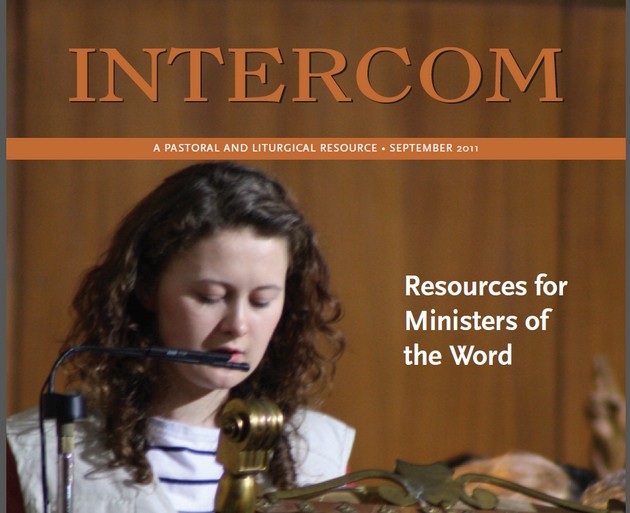 September 2011 issue
September 2011 issue
Click on link to view Intercom September contents
Editorial and Newsletter resources
Feature Article
Resources for Ministers of the Word
Máire Byrne
Introduction
Reading the Sacred Scriptures in public has always characterised Christian worship. It is one of the oldest and most important aspects of the liturgy, having its pre-Christian foundation in the Jewish synagogue. In modern times, the General Instruction of the Roman Missal (GIRM) reminds us that when the Scriptures are read in the church, it is God who is speaking to the assembled people, and Christ, present in his own word, proclaims the Gospel. There is no doubt then that the person who proclaims the Word during the Liturgy of the Word has an important role. During the liturgy the reader is fulfilling a mission to their fellow community members.
Obviously it is a privilege to read the sacred scriptures at Mass. It is also a rewarding and spiritual experience for the individual involved. It is important then for parishes to ensure that those who read the Word are equipped with the tools and skills to undertake this task and are fully supported in their role of to making the Liturgy of the Word as meaningful as possible for the assembled congregation and this series intends to facilitate these developments.
Recruiting Ministers of the Word
Many parishes now have a dedicated pastoral group to administer the Minsters of the Word or readers, and to schedule the times they are required. Some parishes are smaller and do not require a panel, but this series of articles is for all sizes of groups. One thing required by all parishes is more volunteer readers and it is important to remember when starting your recruitment drive that the ministry is an important position of responsibility. Not everyone makes a good Minister of the Word and it is important to stress this from the start (while indicating that those with other skills would be most welcome elsewhere!). Some people do not like speaking in public, working with a microphone or having all ears and eyes upon them. No one should feel pressured into ‘volunteering’ and it should be made clear that certain criteria are a prerequisite:
- A good speaking voice (though of course training and help will be provided).
- Confidence to deliver the Word to the entire congregation (do mention how support and encouragement will be given).
- The ability to commit to a schedule or rota (the requirements of the schedule should be made as clear as possible on your advertisements. There is no point in giving the impression you have to read on one Sunday every six weeks when in reality it is every month). Note that the schedule will try to accommodate people as much as possible. People with children and young families may prefer a particular time while others may be more flexible. Do indicate if people will need to attend training days or meetings on weekdays.
The GIRM states that: “the faithful should not refuse to serve gladly the people of God whenever asked to perform some particular ministry or role in the celebration” nevertheless, make sure to highlight the ‘benefits’ of becoming a reader, and how your parish views this important role. You should aim to make readers proud of their position, and to feel that they are in the service of the congregation and of God. To this end, highlighting how their own spiritual growth may be enhanced by coming together in prayer at meetings or having some workshops on reading the scriptures is always welcome. Think about having a commissioning ceremony for the readers and possibly presenting them with a certificate of appreciation for their services.
A useful ‘blurb’ that could be used for promotional literature or in an announcement for additional readers:
In proclaiming the word of God, readers exercise their responsibility in mediating the presence of Christ. God speaks to the assembly through them, and, the impact of God’s message will depend significantly on their conviction, their preparation, and their delivery. The reader has responsibility for not simply reading the word, but assisting the assembly to hear the word.
Ministers of the Word, Guidelines prepared by the Liturgy Office of the Bishops’ Conference of England and Wales.
Make sure to have an ‘induction meeting’ or period of formation as commissioned Ministers of the Word will need proper preparation if they are properly to fulfil their responsibilities. How long or how many times you meet is up to you and the number of people attending but it is probably best to have two meetings over two weeks to allow those attending to reflect on what they have learned and discussed and ask questions. It is also useful to schedule meetings for during the year at these initial meetings for discussing readings for different liturgical periods, e.g. Advent and to deal with any queries as they arise.
Next month’s article will discuss the formation of ministers of the word
Intercom
Intercom is a pastoral and liturgical resource magazine published by Veritas, an agency of the Irish Catholic Bishops Commission on Communications.
There are ten issues per year, including double issues for July-August and December-January.
For information on subscribing to Intercom, please contact Ross Delmar (Membership Secretary):
Tel: +353 (0)1 878 8177 Email: [email protected]

